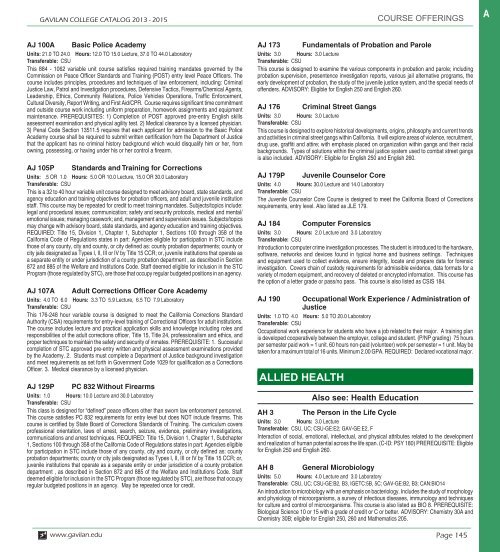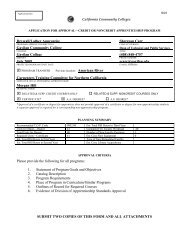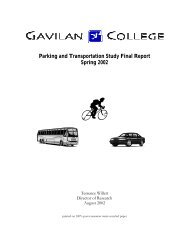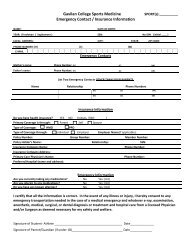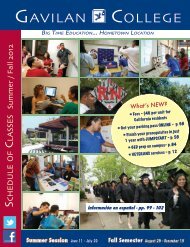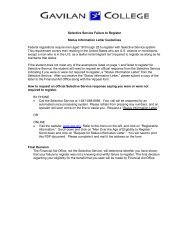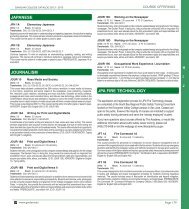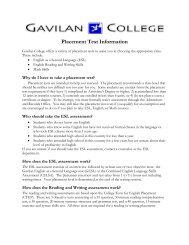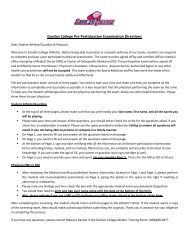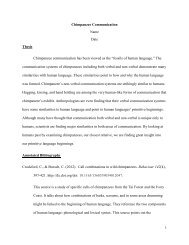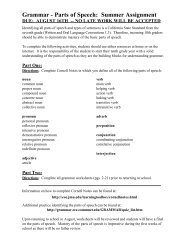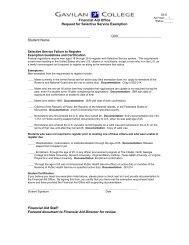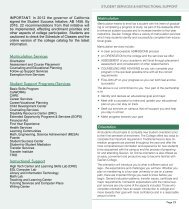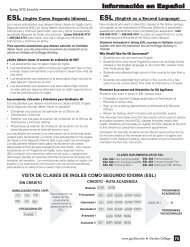Allied Health (AH) - Gavilan College
Allied Health (AH) - Gavilan College
Allied Health (AH) - Gavilan College
- No tags were found...
You also want an ePaper? Increase the reach of your titles
YUMPU automatically turns print PDFs into web optimized ePapers that Google loves.
GAVILAN COLLEGE CATALOG 2013 - 2015AJ 100A Basic Police AcademyUnits: 21.0 TO 24.0 Hours: 12.0 TO 15.0 Lecture, 37.0 TO 44.0 LaboratoryTransferable: CSUThis 884 - 1062 variable unit course satisfies required training mandates governed by theCommission on Peace Officer Standards and Training (POST) entry level Peace Officers. Thecourse includes principles, procedures and techniques of law enforcement, including: CriminalJustice Law, Patrol and Investigation procedures, Defensive Tactics, Firearms/Chemical Agents,Leadership, Ethics, Community Relations, Police Vehicles Operations, Traffic Enforcement,Cultural Diversity, Report Writing, and First Aid/CPR. Course requires significant time commitmentand outside course work including uniform preparation, homework assignments and equipmentmaintenance. PREREQUISITES: 1) Completion of POST approved pre-entry English skillsassessment examination and physical agility test. 2) Medical clearance by a licensed physician.3) Penal Code Section 13511.5 requires that each applicant for admission to the Basic PoliceAcademy course shall be required to submit written certification from the Department of Justicethat the applicant has no criminal history background which would disqualify him or her, fromowning, possessing, or having under his or her control a firearm.AJ 105P Standards and Training for CorrectionsUnits: .5 OR 1.0 Hours: 5.0 OR 10.0 Lecture, 15.0 OR 30.0 LaboratoryTransferable: CSUThis is a 32 to 40 hour variable unit course designed to meet advisory board, state standards, andagency education and training objectives for probation officers, and adult and juvenile institutionstaff. This course may be repeated for credit to meet training mandates. Subjects/topics include:legal and procedural issues; communication; safety and security protocols, medical and mental/emotional issues; managing casework; and, management and supervision issues. Subjects/topicsmay change with advisory board, state standards, and agency education and training objectives.REQUIRED: Title 15, Division 1, Chapter 1, Subchapter 1, Sections 100 through 358 of theCalifornia Code of Regulations states in part: Agencies eligible for participation in STC includethose of any county, city and county, or city defined as: county probation departments; county orcity jails designated as Types I, II, III or IV by Title 15 CCR; or, juvenile institutions that operate asa separate entity or under jurisdiction of a county probation department , as described in Section872 and 885 of the Welfare and Institutions Code. Staff deemed eligible for inclusion in the STCProgram (those regulated by STC), are those that occupy regular budgeted positions in an agency.AJ 107A Adult Corrections Officer Core AcademyUnits: 4.0 TO 6.0 Hours: 3.3 TO 5.9 Lecture, 6.5 TO 7.9 LaboratoryTransferable: CSUThis 176-248 hour variable course is designed to meet the California Corrections StandardAuthority (CSA) requirements for entry-level training of Correctional Officers for adult institutions.The course includes lecture and practical application skills and knowledge including roles andresponsibilities of the adult corrections officer, Title 15, Title 24, professionalism and ethics, andproper techniques to maintain the safety and security of inmates. PREREQUISITE: 1. Successfulcompletion of STC approved pre-entry written and physical assessment examinations providedby the Academy. 2. Students must complete a Department of Justice background investigationand meet requirements as set forth in Government Code 1029 for qualification as a CorrectionsOfficer. 3. Medical clearance by a licensed physician.AJ 129P PC 832 Without FirearmsUnits: 1.0 Hours: 10.0 Lecture and 30.0 LaboratoryTransferable: CSUThis class is designed for “defined” peace officers other than sworn law enforcement personnel.This course satisfies PC 832 requirements for entry level but does NOT include firearms. Thiscourse is certified by State Board of Corrections Standards of Training. The curriculum coversprofessional orientation, laws of arrest, search, seizure, evidence, preliminary investigations,communications and arrest techniques. REQUIRED: Title 15, Division 1, Chapter 1, Subchapter1, Sections 100 through 358 of the California Code of Regulations states in part: Agencies eligiblefor participation in STC include those of any county, city and county, or city defined as: countyprobation departments; county or city jails designated as Types I, II, III or IV by Title 15 CCR; or,juvenile institutions that operate as a separate entity or under jurisdiction of a county probationdepartment , as described in Section 872 and 885 of the Welfare and Institutions Code. Staffdeemed eligible for inclusion in the STC Program (those regulated by STC), are those that occupyregular budgeted positions in an agency. May be repeated once for credit.www.gavilan.eduCOURSE OFFERINGSAJ 173 Fundamentals of Probation and ParoleUnits: 3.0 Hours: 3.0 LectureTransferable: CSUThis course is designed to examine the various components in probation and parole; includingprobation supervision, presentence investigation reports, various jail alternative programs, theearly development of probation, the study of the juvenile justice system, and the special needs ofoffenders. ADVISORY: Eligible for English 250 and English 260.AJ 176 Criminal Street GangsUnits: 3.0 Hours: 3.0 LectureTransferable: CSUThis course is designed to explore historical developments, origins, philosophy and current trendsand activities in criminal street gangs within California. It will explore areas of violence, recruitment,drug use, graffiti and attire; with emphasis placed on organization within gangs and their racialbackgrounds. Types of solutions within the criminal justice system used to combat street gangsis also included. ADVISORY: Eligible for English 250 and English 260.AJ 179P Juvenile Counselor CoreUnits: 4.0 Hours: 30.0 Lecture and 14.0 LaboratoryTransferable: CSUThe Juvenile Counselor Core Course is designed to meet the California Board of Correctionsrequirements, entry level. Also listed as JLE 179.AJ 184 Computer ForensicsUnits: 3.0 Hours: 2.0 Lecture and 3.0 LaboratoryTransferable: CSUIntroduction to computer crime investigation processes. The student is introduced to the hardware,software, networks and devices found in typical home and business settings. Techniquesand equipment used to collect evidence, ensure integrity, locate and prepare data for forensicinvestigation. Covers chain of custody requirements for admissible evidence, data formats for avariety of modern equipment, and recovery of deleted or encrypted information. This course hasthe option of a letter grade or pass/no pass. This course is also listed as CSIS 184.AJ 190 Occupational Work Experience / Administration ofJusticeUnits: 1.0 TO 4.0 Hours: 5.0 TO 20.0 LaboratoryTransferable: CSUOccupational work experience for students who have a job related to their major. A training planis developed cooperatively between the employer, college and student. (P/NP grading) 75 hoursper semester paid work = 1 unit. 60 hours non-paid (volunteer) work per semester = 1 unit. May betaken for a maximum total of 16 units. Minimum 2.00 GPA. REQUIRED: Declared vocational major.ALLIED HEALTHAlso see: <strong>Health</strong> Education<strong>AH</strong> 3 The Person in the Life CycleUnits: 3.0 Hours: 3.0 LectureTransferable: CSU, UC; CSU-GE:E2; GAV-GE:E2, FInteraction of social, emotional, intellectual, and physical attributes related to the developmentand realization of human potential across the life span. (C-ID: PSY 180) PREREQUISITE: Eligiblefor English 250 and English 260.<strong>AH</strong> 8 General MicrobiologyUnits: 5.0 Hours: 4.0 Lecture and 3.0 LaboratoryTransferable: CSU, UC; CSU-GE:B2, B3, IGETC:5B, 5C; GAV-GE:B2, B3; CAN:BIO14An introduction to microbiology with an emphasis on bacteriology. Includes the study of morphologyand physiology of microorganisms, a survey of infectious diseases, immunology and techniquesfor culture and control of microorganisms. This course is also listed as BIO 8. PREREQUISITE:Biological Science 10 or 15 with a grade of credit or C or better. ADVISORY: Chemistry 30A andChemistry 30B; eligible for English 250, 260 and Mathematics 205.Page 145ABCDEFGHIJKLMNOPQRSTUVW
COURSE OFFERINGSGAVILAN COLLEGE CATALOG 2013 - 2015<strong>AH</strong> 9 Human PhysiologyUnits: 5.0 Hours: 4.0 Lecture and 3.0 LaboratoryTransferable: CSU, UC; CSU-GE:B2, B3, IGETC:5B, 5C; GAV-GE:B2, B3; CAN:BIO12A study of the functions of the major organs and organ systems of the human body, emphasizingcontrol at the cellular level, integration of systems and homeostasis of the human body. Thiscourse is also listed as BIO 9. PREREQUISITE: Biological Science 7 or 15 with a grade of creditor C or better or equivalent. ADVISORY: Chemistry 30A and Chemistry 30B; eligible for English250, English 260 and Mathematics 205.<strong>AH</strong> 11 NutritionUnits: 3.0 Hours: 3.0 LectureTransferable: CSU, UC; CSU-GE:E2; GAV-GE:E2, F; CAN:FCS2This course is designed to meet the needs of the <strong>Allied</strong> <strong>Health</strong> student and the general educationstudent alike. The major aim of this course is to help the student acquire relevant informationabout nutrition which they can use professionally and/or personally. The course will cover thepractical aspects of normal nutrition, ways to promote sound eating habits throughout the lifecycle, and physiological contribution nutrients make to body structure and function. This courseis also listed as BIO 11. PREREQUISITE: Eligible for English 250 and English 260. ADVISORY:Chemistry 30A and Mathematics 205.<strong>AH</strong> 15 Survey of Human Anatomy and PhysiologyUnits: 5.0 Hours: 4.0 Lecture and 3.0 LaboratoryTransferable: CSU, UC; CSU-GE:B2, B3, IGETC:5B, 5C; GAV-GE:B2, B3An introductory study of the structure and function of the human body. Includes study at the cellularand organ system levels, emphasizing integration of systems. Note that a cadaver will be observedin this course. This course is also listed as BIO 15. ADVISORY: Biology 10 or Biology 12 witha grade of ‘C’ or better. Eligible for English 250, English 260 and Mathematics 205. Course willinclude viewing of a cadaver.<strong>AH</strong> 16A IV Therapy / Blood Withdrawal / AUnits: 1.0 Hours: 1.0 LectureTransferable: CSUTheoretical application and clinical techniques required for safe administration of IV therapy andwithdrawal of blood for testing. (Approved by the Board of Vocational Nursing for certification in IVTherapy and Blood Withdrawal. Approved for continuing education credit BRN #00892). Previouslylisted as <strong>AH</strong> 16. COREQUISITE: Enrollment in <strong>AH</strong> 51 or current active LVN licensure in California.$50.00 course materials fee payable at registration.<strong>AH</strong> 16B IV Therapy / Blood Withdrawal / BUnits: 1.0 Hours: 1.0 LectureTransferable: CSUTheoretical application and clinical techniques required for safe administration of IV therapy andwithdrawal of blood for testing. (Approved by the Board of Vocational Nursing for certification in IVTherapy and Blood Withdrawal. Approved for continuing education credit BRN #00892). Previouslylisted as <strong>AH</strong> 16. COREQUISITE: Enrollment in <strong>AH</strong> 52 or current active LVN licensure in California.$50.00 course materials fee payable at registration.<strong>AH</strong> 16C IV Therapy / Blood Withdrawal / CUnits: 1.0 Hours: 1.0 LectureTransferable: CSUTheoretical application and clinical techniques required for safe administration of IV therapy andwithdrawal of blood for testing. (Approved by the Board of Vocational Nursing for certification in IVTherapy and Blood Withdrawal. Approved for continuing education credit BRN #00892). Previouslylisted as <strong>AH</strong> 16. COREQUISITE: Enrollment in <strong>AH</strong> 53 or current active LVN licensure in California.$50.00 course materials fee payable at registration.<strong>AH</strong> 16D IV Therapy / Blood Withdrawal / DUnits: 1.0 Hours: 1.0 LectureTransferable: CSUTheoretical application and clinical techniques required for safe administration of IV therapy andwithdrawal of blood for testing. (Approved by the Board of Vocational Nursing for certification in IVTherapy and Blood Withdrawal. Approved for continuing education credit BRN #00892). Previouslylisted as <strong>AH</strong> 16. COREQUISITE: Enrollment in <strong>AH</strong> 54 or current active LVN licensure in California.$50.00 course materials fee payable at registration.<strong>AH</strong> 30 Standard First Aid and CardiopulmonaryResuscitationUnits: 2.0 Hours: 2.0 LectureTransferable: CSU, UC; GAV-GE:E2First aid training to prepare people to meet the needs of emergencies when medical assistance isdelayed. Incorporates the techniques of cardiopulmonary resuscitation. Includes information on thecare of wounds, fractures, burns, poisoning, shock, as well as elementary rescue transportation.A satisfactory grade qualifies the student for a Red Cross Standard First Aid card and the RedCross CPR card. May be repeated three times for credit.<strong>AH</strong> 32 Basic Cardiac Life SupportUnits: 1.0 Hours: 1.0 LectureTransferable: CSUCourse designed to teach students skills in adult, child and infant cardiopulmonary resuscitation.Specifically designed for health professionals. Successful completion will result in certification bythe American Heart Association or American Red Cross. This is a pass/no pass course. May berepeated three times for credit. $12.00 course material fee. Additional $5.00 due upon completionfor certification card.<strong>AH</strong> 51 Medical-Surgical NursingUnits: 11.0 Hours: 6.0 Lecture and 15.0 LaboratoryTransferable: CSUCourse is designed to provide a basic introduction to patient care within the role of the nurse.Emphasizes principles and skills necessary for safe, effective care. Content includes introduction tohealth care, effective communication, client rights and needs, asepsis, personal care, safety, andgerontology. Related pharmacology is included. $100 course material fee, payable at registration.PREREQUISITE: Admission to the nursing program. COREQUISITE: <strong>AH</strong> 16A.<strong>AH</strong> 52 Medical-Surgical NursingUnits: 11.0 Hours: 6.0 Lecture and 15.0 LaboratoryTransferable: CSUCourse is designed to provide both theoretical and clinical experience in the care of adult, medicalsurgicalclients. This course will further refine basic nursing skills and introduce more complicatednursing situations. Content includes pre-operative and post-operative care of the client with pain,cancer, and care of the client with disorders of musculoskelatal, integument, gastrointestinal, andrespiratory systems. Related pharmacology in included. $100 course material fee, payable atregistration. PREREQUISITE: Completion of <strong>AH</strong> 51. COREQUISITE: <strong>AH</strong> 16B.<strong>AH</strong> 53 Medical-Surgical - Maternal-Neonatal NursingUnits: 11.0 Hours: 6.0 Lecture and 15.0 LaboratoryTransferable: CSUCourse contains two components to provide theoretical and clinical experience in medical-surgicaland maternal- neonatal nursing. Content includes care of clients with disorders of the circulatory,urinary and reproductive systems, normal pregnancy and birth, common or major complications,care of the normal newborn, and neonate with special problems. Related pharmacology is included.$100 course material fee, payable at registration. PREREQUISITE: Completion of <strong>AH</strong> 51 and<strong>AH</strong> 52. COREQUISITE: <strong>AH</strong> 16C.All courses listed here are part of <strong>Gavilan</strong> <strong>College</strong>’s approved curriculum.All courses are not offered every semester. Check the Class Schedule forcurrent offerings.Page 146www.gavilan.edu
GAVILAN COLLEGE CATALOG 2013 - 2015<strong>AH</strong> 54 Medical-Surgical / Pediatric NursingUnits: 11.0 Hours: 6.0 Lecture and 15.0 LaboratoryTransferable: CSUCourse contains two components to provide theoretical and clinical experience in medicalsurgical and pediatric nursing. Content includes care of clients with disorders of the endocrineand neurosensory systems, mental health, emergency nursing and care of the child, includingpreventative measures and health teaching. A leadership component is included to preparethe student for the realistic work assignment of the nurse. $100 course material fee, payableat registration. PREREQUISITE: Completion of <strong>AH</strong> 51, 52 and 53. COREQUISITE: <strong>AH</strong> 16D.<strong>AH</strong> 55 Interactive and Mental <strong>Health</strong> NursingUnits: 10.0 Hours: 5.5 Lecture and 13.5 LaboratoryTransferable: CSUThe dynamics of leadership and management in nursing, including concepts of basic mentalhealth. Progresses from basic mental health knowledge and skills to the refinements involvedin psychiatric nursing practice as it relates to all age groups. Incorporates nursing concepts andnursing experiences relative to human sexuality, child abuse and cultural and ethnic diversity.$100 course material fee, payable at registration. PREREQUISITE: Admission to advancedstanding / RN program and California IV Certification and successful completion of <strong>AH</strong> 51, 52,53 and 54 or equivalent.<strong>AH</strong> 56 Compensatory Nursing PracticeUnits: 10.0 Hours: 5.5 Lecture and 13.5 LaboratoryTransferable: CSUConcepts and principles of the nursing process applied to preventative, remedial, supportive,rehabilitative, and teaching aspects in meeting the health needs of the patient requiringcompensatory nursing interventions. Incorporates nursing concepts and experiences with all agegroups, including senior adults. $100 course material fee, payable at registration. PREREQUISITE:Successful completion of <strong>AH</strong> 55 and an active valid, unrestricted California LVN.<strong>AH</strong> 140 Online <strong>Health</strong> ResearchUnits: 2.0 Hours: 2.0 LectureTransferable: CSUA beginning course on how to find reliable, current health-related information, using the Internetand other electronic resources. This course is also listed as LIB 140.<strong>AH</strong> 170 Basic Clinical Medical AssistingUnits: 6.0 Hours: 4.0 Lecture and 6.0 LaboratoryTransferable: CSUCourse provides a basic introduction to clinical medical assisting. Emphasizes principles,understanding of skills necessary to perform basic clinical medical assisting procedures safelyand effectively. PREREQUISITE: Eligible for English 250, English 260 and Mathematics 205.<strong>AH</strong> 171 Advanced Clinical Medical AssistingUnits: 6.0 Hours: 4.0 Lecture and 6.0 LaboratoryTransferable: CSUCourse provides instruction and clinical experience in advanced concepts of clinical medicalassisting including specialty procedures and treatments. PREREQUISITE: <strong>AH</strong> 170 with a gradeof C or better or equivalent. Equivalency determined by written and performance exams.<strong>AH</strong> 180 Fundamentals of Nursing--ConvalescentUnits: 8.0 Hours: 6.0 Lecture and 7.0 LaboratoryTransferable: CSUA course to provide a basic introduction to patient care in the convalescent setting. Emphasizesprinciples, understanding and skills necessary to perform basic nursing procedures safely andeffectively. Includes introduction to health care, planning, safety, infection control, personal care,basic procedures, rehabilitation, nutrition and clients’ rights and needs. At the completion of thiscourse students will qualify for state certification as a nursing assistant. PREREQUISITE: Eligiblefor English 250 and English 260 and eligible for MATH 205 or MATH 430. Clearance from theDepartment of <strong>Health</strong> Services (Form HS283), fingerprint card, and health clearance requiredprior to clinical placement. <strong>Health</strong> and fingerprint clearance required prior to clinical placement.Uniform, shoes, watch, and stethoscope required. Clinical in Morgan Hill or Hollister, as assigned.www.gavilan.eduCOURSE OFFERINGS<strong>AH</strong> 182 Home <strong>Health</strong> CareUnits: 2.0 Hours: 1.5 Lecture and 1.5 LaboratoryTransferable: CSUCourse is designed to prepare students to provide basic health care in the home. Includesinterpretation of medical/social needs, personal care services, cleaning tasks, nutrition, and thescope of limitations of a home health aide. All students who achieve a grade of “C” or better will beeligible for a Home <strong>Health</strong> Aide certificate from the State of California. PREREQUISITE: CaliforniaCNA certification or concurrent enrollment in <strong>AH</strong> 180 or equivalent. Equivalency determined bywritten and performance exams. Also, eligible for English 250 and English 260. Clearance fromthe Department of <strong>Health</strong> Services (Form HS283), fingerprint card, and health clearance requiredprior to clinical placement.<strong>AH</strong> 190 Occupational Work Experience / <strong>Allied</strong> <strong>Health</strong>Units: 1.0 TO 4.0 Hours: 5.0 TO 20.0 LaboratoryTransferable: CSUOccupational work experience for students who have a job related to their major. A training planis developed cooperatively between the employer, college and student. (P/NP grading) 75 hoursper semester paid work = 1 unit. 60 hours non-paid (volunteer) work per semester = 1 unit. May betaken for a maximum total of 16 units. Minimum 2.00 GPA. REQUIRED: Declared vocational major.<strong>AH</strong> 191A Workplace SkillsUnits: 1.0 Hours: 1.0 LectureTransferable: CSUWorkplace Skills teaches skills vital to workplace success. The topic for 191A is InterpersonalCommunication. Need not be taken in sequence. This is a pass/no pass course.<strong>AH</strong> 191B Workplace SkillsUnits: 1.0 Hours: 1.0 LectureTransferable: CSUWorkplace Skills teaches skills vital to workplace success. The topic for 191B is Team Building.Need not be taken in sequence. This is a pass/no pass course.<strong>AH</strong> 191C Workplace SkillsUnits: 1.0 Hours: 1.0 LectureTransferable: CSUWorkplace Skills teaches skills vital to workplace success. The topic for 191C is Problem-Solving.Need not be taken in sequence. This is a pass/no pass course.Anatomy: see Biological SciencesANTHROPOLOGYANTH 1 Introduction to Physical AnthropologyUnits: 3.0 Hours: 3.0 LectureTransferable: CSU, UC; CSU-GE:B2, IGETC:5B; GAV-GE:B2; CAN:ANTH2Explores and analyzes human biological, social and cultural development over the last severalmillion years. The implications of evolutionary theory for the world today are considered. Principaltopics are evolutionary theory, Mendelian and molecular genetics, the fossil record, primatology,the nature of human diversity, biocultural analysis of malnutrition, and the question of continuingevolution. ADVISORY: English 250, English 260 and Mathematics 205.ANTH 2 Introduction to ArchaeologyUnits: 3.0 Hours: 3.0 LectureTransferable: CSU, UC; CSU-GE:D1, IGETC:4A; GAV-GE:D2The study of the human past through material culture remains. Artifacts, sites, settlements andlandscapes will be studied to help reveal how people lived, how they saw themselves and theirworld, what the environment was like and how these factors interrelated and changed throughtime. Explores and analyzes the development of the concepts and methods of anthropologicalarchaeology. Surveys selected prehistoric cultures. Training in archaeological methods, siterecognition, recording and preservation, and cultural resource management. ADVISORY:Recommended English 250 and English 260.Page 147ABCDEFGHIJKLMNOPQRSTUVW


